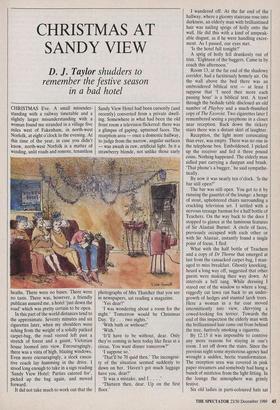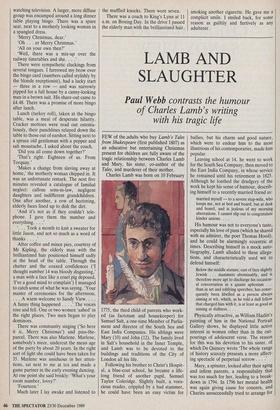CHRISTMAS AT SANDY VIEW
D. J. Taylor shudders to
remember the festive season in a bad hotel
CHRISTMAS Eve. A small misunder- standing with a railway timetable and a slightly larger misunderstanding with a woman found me stranded in a village five miles west of Fakenham, in north-west Norfolk, at eight o'clock in the evening. At this time of the year, in case you didn't know, north-west Norfolk is a matter of winding, unlit roads and remote, tenantless
heaths. There were no buses. There were no taxis. There was, however, a friendly publican assured me, a hotel 'just down the road' which was pretty certain to be open.
In this part of the world distances tend to the approximate. Seventy minutes and six cigarettes later, when my shoulders were aching from the weight of a solidly packed carpet-bag, the road veered left past a stretch of forest and a gaunt, Victorian house loomed into view. Encouragingly, there was a vista of high, blazing windows. Even more encouragingly, a sleek execu- tive coach lay humming in the drive. I stood long enough to take in a sign reading `Sandy View Hotel: Parties catered for', picked up the bag again, and moved forward.
It did not take much to work out that the Sandy View Hotel had been cursorily (and recently) converted from a private dwell- ing. Somewhere in what had been the old front room a television flickered: there was a glimpse of gaping, upturned faces. The reception area — once a domestic hallway, to judge from the narrow, angular surfaces — was awash in raw, artificial light. In it a strawberry blonde, not unlike those early photographs of Mrs Thatcher that you see in newspapers, sat reading a magazine. `Yes dear?'
`I was wondering about a room for the night.' Tomorrow would be Christmas Day. 'Er . . . two nights.'
`With bath or without?'
`With.'
`It'll have to be without, dear. Only they're coming in here today like fleas at a circus. You want dinner tomorrow?'
`I suppose so.'
`That'll be 70 quid then.' The incongrui- ty of the situation seemed suddenly to dawn on her. 'Haven't got much luggage have you, dear?'
`It was a mistake, and I . . .
`Thirteen then, dear. Up on the first floor.' I wandered off. At the far end of the hallway, where a gloomy staircase rose into darkness, an elderly man with brilliantined hair was nailing sprigs of holly onto the wall. He did this with a kind of unspeak- able disgust, as if he were handling excre- ment. As I passed, our eyes met.
`Is the hotel full tonight?'
A sprig of holly fell drunkenly out of trim. 'Eighteen of the buggers. Came in by coach this afternoon.'
Room 13, at the far end of the shadowy corridor, had a factitiously homely air. On the wall above the bed there was an embroidered biblical text — at least I suppose that 'I need thee more each passing hour' is a biblical text. A trawl through the bedside table disclosed an old number of Playboy and a much-thumbed copy of The Exorcist. Two cigarettes later I remembered seeing a payphone in a closet near reception. Back down the rickety stairs there was a distant skirl of laughter.
Reception, the light more coruscating than ever, was empty. There was no one in the telephone box. Emboldened, I picked up the receiver and fed it three pound coins. Nothing happened. The elderly man sidled past carrying a dustpan and brush. `That phone's a bugger,' he said sympathe- tically.
By now it was nearly ten o'clock. 'Is the bar still open?'
The bar was still open. You got to it by running the gauntlet of the lounge: a henge of stout, upholstered chairs surrounding a crackling television set. I settled with a nervous teenage barman for a half bottle of Teachers. On the way back to the door I stopped to glance at the luminous features of Sir Alastair Burnet. A circle of faces, previously occupied with each other or with Sir Alastair, instantly found a single point of focus. I fled.
What with the half bottle of Teachers and a copy of Dr Thorne that emerged at last from the ransacked carpet-bag, I man- aged to miss breakfast. Ghostly knocking, heard a long way off, suggested that other guests were making their way down. At intervals a bell rang. While dressing I stared out of the window to where a long, raggedly cut lawn ran back to an under- growth of hedges and stunted larch trees. Here a woman in a fur coat moved intermittently into view, chivvying a cowed-looking fox terrier. Towards the end of this inspection the elderly man with the brilliantined hair came out from behind the tree, furtively smoking a cigarette.
By 12.15 it was impossible to contrive any more reasons for staying in one's room. I set off down the stairs. Since the previous night some mysterious agency had wrought a sudden, hectic transformation. The reception area was covered in pink paper streamers and somebody had hung a bunch of mistletoe from the light fitting. In the lounge the atmosphere was grimly festive.
Six old ladies in parti-coloured hats sat watching television. A larger, more diffuse group was encamped around a long dinner table playing bingo. There was a spare seat, next to a motherly looking woman in a spangled dress.
`Merry Christmas, dear.'
`Oh . . . er Merry Christmas.'
`All on your own then?'
`Well, there was a mix-up over the railway timetables and she. . .
There were sympathetic cluckings from several tongues. I furrowed my brow over the bingo card (numbers called stylishly by the blonde receptionist), had a lucky start — three in a row — and was narrowly pipped for a full house by a canny-looking man in a brown suit. His share-out came to £4.48. There was a promise of more bingo after lunch.
Lunch (turkey roll), taken at the bingo table, was a meal of desperate hilarity. Cracker mottoes were read out ostenta- tiously, their punchlines relayed down the table to those out of earshot. Sitting next to a spruce old gentleman with a pepper and salt moustache, I asked about the coach.
Did you all come down together?'
`That's right. Eighteen of us. From Torquay.'
`Makes a change from slaving away at home,' the motherly woman chipped in. It was an unfortunate remark. The next five minutes revealed a catalogue of familial neglect: callous sons-in-law, negligent daughters and indifferent grandchildren. One after another, a row of hectoring, elderly faces lined up to dish the dirt.
`And it's not as if they couldn't tele- phone. I gave them the number and everything. . .
. . Took a month to knit a sweater for little Jason, and not so much as a word of thanks . . .
After coffee and mince pies, courtesy of Mr Kipling, the elderly man with the brilliantined hair positioned himself sadly at the head of the table. Through the chatter and the coaxed confidences CI thought number 14 was bloody disgusting,' a man with a face like a cruel pig deposed, I've a good mind to complain') I managed to catch some of what he was saying. 'Your master of ceremonies for the afternoon. . . A warm welcome to Sandy View. . . . A funny thing happened . . . .' The voices rose and fell. One or two women `aahed' in the right places. Two men began to play dominoes.
There was community singing (`So here it is, Merry Christmas') and pass-the- parcel. There was also Marlene. Marlene, somebody's niece, undercut the mean age of the party by about 20 years. In the right sort of light she could have been taken for 35. Marlene was assiduous in her atten- tions, sat next to me at tea and made a game partner in the early evening dancing. At one point she said briskly: 'What's your room number, lovey?'
`Fourteen.'
Much later I lay awake and listened to the muffled knocks. There were seven. There was a coach to King's Lynn at 11 a.m. on Boxing Day. In the drive I passed the elderly man with the brilliantined hair, smoking another cigarette. He gave me a complicit smile. I smiled back, for some reason as guiltily and furtively as any adulterer.











































































































 Previous page
Previous page